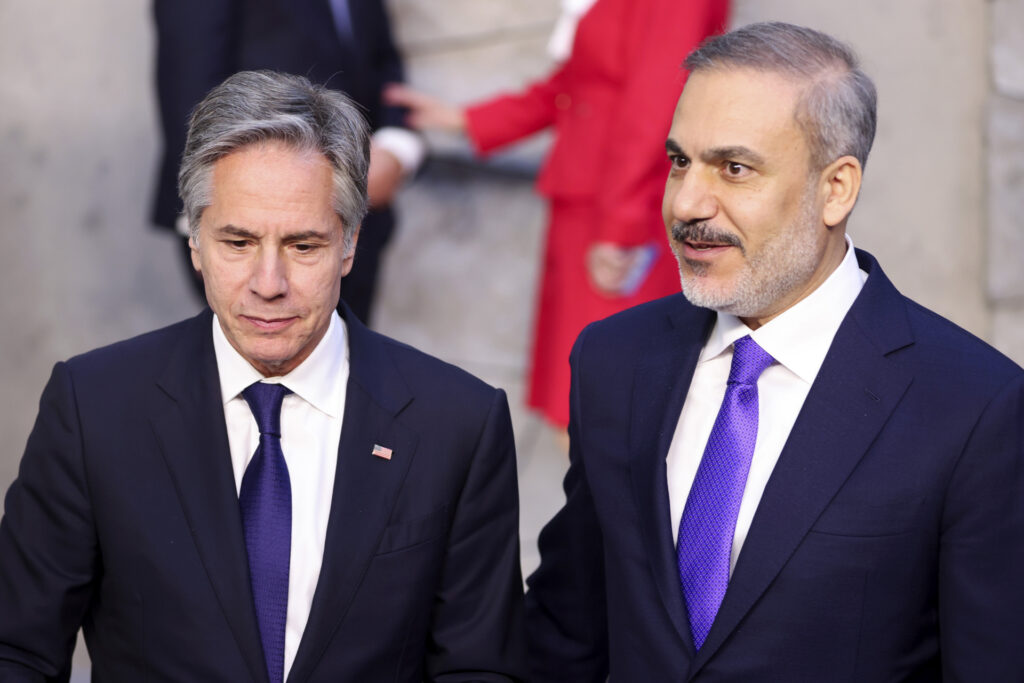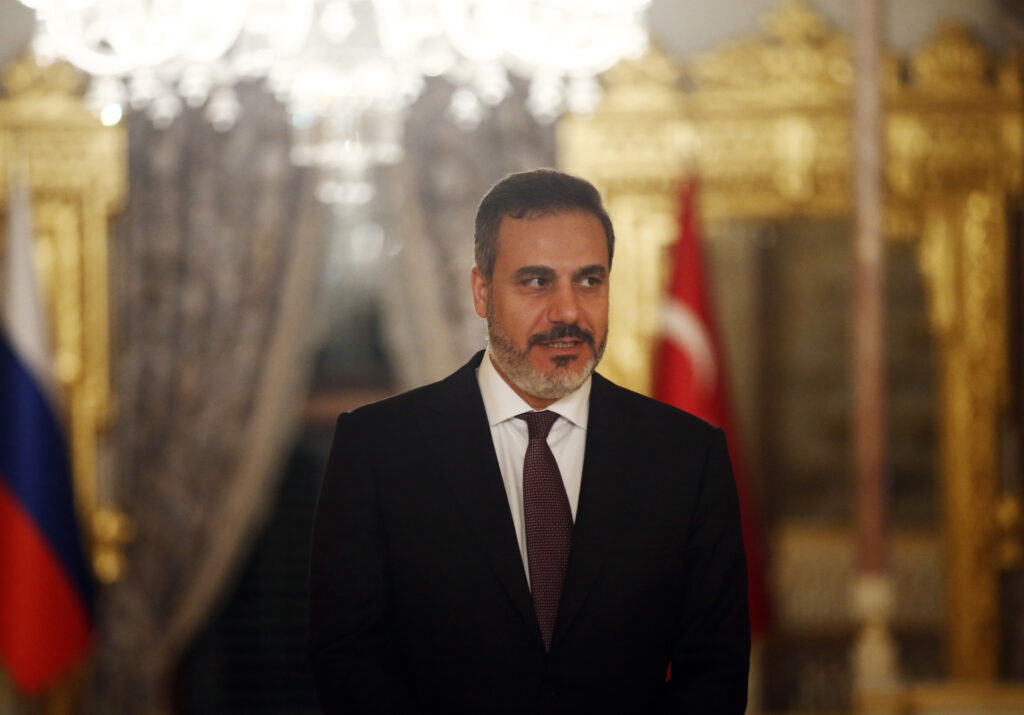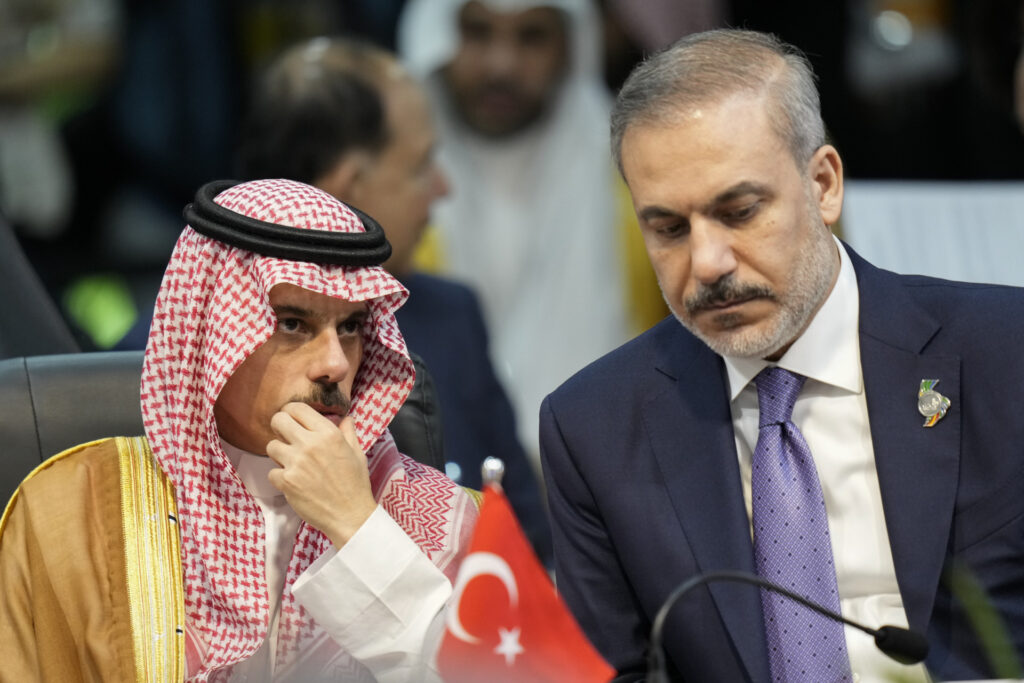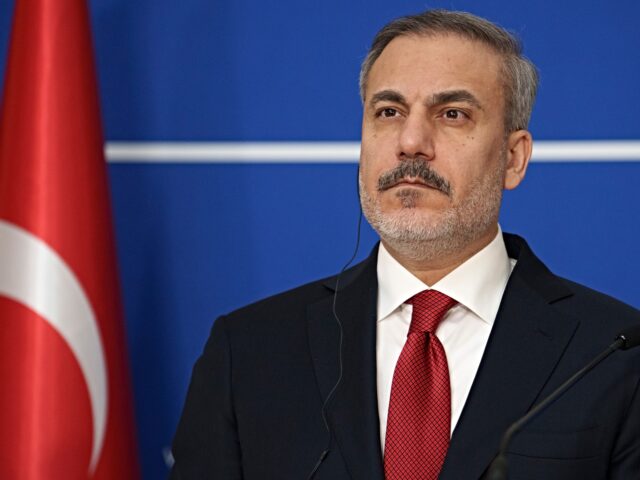Turkish Foreign Minister Hakan Fidan is expected to attend a meeting next week of top diplomats of BRICS member nations, multiple outlets reported on Tuesday, following remarks in which he expressed his nation’s interest in joining the bloc.
BRICS is an international coalition originally consisting of Brazil, Russia, India, China, and South Africa, the nations that gave it its name. In January, BRICS welcomed Egypt, Iran, Ethiopia, and the United Arab Emirates (UAE) to its fold, as well as Saudi Arabia, which as of February had not completed the formalities required to become a full member.
The BRICS platform presents itself as a challenge to the American-led world order and an alternative to other international platforms in which America and other Western states play a prominent role. BRICS members such as China and Russia support their geopolitical interests at the United Nations and other venues and offer each other favorable trade deals. BRICS members have also used the platform to seek alternative currencies for foreign trade, attempting to weaken the U.S. dollar.
“Certainly, we would like to become a member of BRICS. So we’ll see how it goes this year,” Fidan reportedly said on Monday at an event in Beijing, calling BRICS a “good alternative” to the European Union. Fidan reportedly complained that the European Union had not fully accepted Turkey as a result of “identity politics,” forcing Ankara to seek other options.

U.S. Secretary of State Antony Blinken, left, speaks with Turkey’s Foreign Minister Hakan Fidan during a group photo of NATO foreign ministers at NATO headquarters in Brussels, Wednesday, April 3, 2024. (Johanna Geron, Pool Photo via AP)
“We see potential in BRICS,” Fidan reportedly said.
Potential BRICS membership for Turkey is reportedly on the agenda at the meeting of BRICS foreign ministers next week, Kremlin spokesman Dmitry Peskov confirmed on Tuesday. Russia is hosting the meeting and this year’s BRICS summit.
“We, of course, all welcome the increased interest in BRICS on the part of our neighbors, including such important partners as Türkiye,” Peskov told reporters, according to the Turkish state Anadolu news agency. Türkiye is the Turkish government’s preferred spelling for the name of the country.
“BRICS is interested in maintaining contacts with all interested states. For this purpose, various formats for maintaining contacts are now being thought through,” Peskov continued. “This is a process extended over time. But we welcome such keen interest.”

File/Turkey’s secret service (MIT) chief Hakan Fidan, waits for a meeting with the Russian delegation in Istanbul, Monday, Oct. 10, 2016. Turkey and Russia signed an intergovernmental agreement for a project that would bring gas from Russia to Turkey. It would then be distributed to European Union nations. (AP Photo/Emrah Gurel)
Turkey initially expressed interest in joining BRICS long before the second wave of members were inducted this year. Islamist Turkish President Recep Tayyip Erdogan attended the 2018 BRICS summit in South Africa, openly stating he hoped Ankara could one day apply to join the coalition. Reports on the negotiations that led to the addition of the four new members did not often mention Turkey, however.
If accepted, Turkey would be the first NATO ally to enter the BRICS coalition, potentially complicating the country’s relationship with the West. Russia was once a NATO partner, but had its partnership suspended “following North Atlantic Council decisions related to the security environment.” Egypt is part of the “Mediterranean Dialogue” and the UAE is a member of the “Istanbul Cooperation Initiative,” both fora intended to give NATO platforms to maintain friendly ties with non-members.
French President Emmanuel Macron floated his desire to be invited to the 2023 BRICS summit, but his suggestion was mostly met with confusion and disgust.
BRICS largely serves as a forum to align the national interests of member countries on the international stage. While it has yielded some policy successes, the varied pursuits of the nations in the group have led to some discord. India and China, in particular, have one of the world’s most combative large-power relationships, hampered by China’s repeated attempts to colonize sovereign Indian land.
The two militaries fought a battle over Himalayan terrain in India’s Ladakh region in 2020 in which the Indian military claimed to have killed twice the number of People’s Liberation Army (PLA) soldiers at the Indian troops lost. China has continued to irritate India following the battle with the publication of “official” maps showing parts of India behind China’s border.

Saudi Arabia’s Foreign Minister Prince Faisal bin Farhan Al-Saud, left, and Turkey’s Foreign Minister Hakan Fidan attend the G20 foreign ministers meeting in Rio de Janeiro, Brazil, Wednesday, Feb. 21, 2024. (AP Photo/Silvia Izquierdo)
The relationship between Iran and Saudi Arabia has also prompted outside concern, as the two engaged in a proxy war in Yemen for years before being invited to join BRICS together. The Chinese Communist Party attempted to prevent any discord through brokering an agreement made public in March 2023 between the two countries in which they committed to normalizing their relationship, reopening embassies in each other’s capitals, and maintaining diplomatic communication.
Fidan, the Turkish foreign minister, is currently on a brief trip to China, including an initial stop in Beijing followed by stops in Kashgar and Urumqi, both located in occupied East Turkistan. China is currently conducting a genocide of the indigenous population of East Turkistan, the majority of them Turkic Uyghur people, but the Turkish government has silenced most of its criticism of Beijing’s abuse of the Uyghurs following its decision to join the Belt and Road Initiative (BRI), China’s global infrastructure scheme, in 2015.
While Erdogan once openly condemned China for conducting a genocide against Turkic people, Fidan appeared eager to expand ties with China and help obscure its atrocities in East Turkistan during his remarks before reporters on Monday and Tuesday.

COMMENTS
Please let us know if you're having issues with commenting.